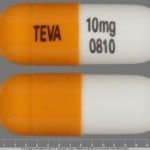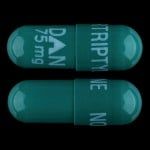Drug Class: Antidepressant, Tricyclic
Table of Contents
- Overview
- How to Take It
- Side Effects
- Warnings & Precautions
- Drug Interactions
- Dosage & Missing a Dose
- Storage
- Pregnancy or Nursing
- More Information
Overview
Nortriptyline is a tricyclic antidepressant used for short-term treatment of various forms of depression. It may help increase feelings of well being and improve mood. It may also relieve tension and anxiety as well as increase energy level. Your doctor may prescribe this medicine for other conditions as well.
Nortriptyline is not approved for use in children.
This medication works by increasing the levels of serotonin in the brain, a chemical that affects one’s mood. It may take 3 or 4 weeks to reach the desired effect.
This information is for educational purposes only. Not every known side effect, adverse effect, or drug interaction is in this database. If you have questions about your medicines, talk to your health care provider.
How to Take It
Take this medicine as directed. It can be taken with or without food. Do not stop taking this medicine abruptly without consulting with your doctor.
Side Effects
Side effects that may occur while taking this medicine include:
- dry mouth
- constipation
- blurred vision
- drowsiness
- nervousness
- dizziness
- weight gain
- headache
Contact your doctor immediately if you experience:
- fainting
- vision changes
- extreme dizziness
- irregular or fast heartbeat
- eye pain
- eye swelling
Warnings & Precautions
- This medicine should NOT be used by those who have taken MAO inhibitors in the last two weeks, by those with narrow angle glaucoma, or by those with cardiac rhythm problems.
- When first taking an antidepressant, some young people think about suicide. Your doctor will regularly monitor progress while you are being treated with nortriptyline. Family or other caregivers should also be aware of changes in your symptoms or mood.
- DO NOT discontinue this medicine abruptly.
- DO NOT take nortriptyline if you have had a heart attack recently or if you are being treated with methylene blue injections.
- Tell your doctor if you have had liver disease, problems with urination, bipolar disorder, thyroid or heart problems, seizures, diabetes, or schizophrenia.
- Elderly patients generally should avoid it because of an increase in dizziness and falls.
- This medicine may cause dizziness or drowsiness. Alcoholic beverages can increase the side effects of this medicine and should be avoided.
- For an overdose, seek medical attention immediately. For non-emergencies, contact your local or regional poison control center at 1-800-222-1222.
Drug Interactions
Before taking any new medicine, either prescription or over-the-counter, check with your doctor or pharmacist. This includes supplements and herbal products.
Possible drug interactions may occur with phenobarbital causing a decrease in the effect of the medications. Severe blood pressure problems and seizure can occur with taken with MAO inhibitors.
Dosage & Missed Dose
The typical dose for adults is 25 mgs, adminstered 3 -4x / day.
The typical dose for adolescents is 30 – 50 mg, 1x / day or divided into doses.
Take your next dose as soon as you remember. If it is time for your next dose, skip the missed dose and go back to your regular schedule. Do not double doses or take extra medicine to make up for the missed dose.
Storage
Keep this medication in the container it came in, tightly closed, and out of reach of children. Store it at room temperature and away from excess heat and moisture (preferably not in the bathroom). Throw away any medication that is outdated or no longer needed.
Pregnancy/Nursing
For women, it should be avoided during pregnancy and lactation. As with other medications, if you suspect that you may be pregnant, talk to your physician or pharmacist before using this medication.
More Information
For more information, talk to your doctor, pharmacist, or health care provider, or you can visit this website, https://www.nlm.nih.gov/medlineplus/druginfo/meds/a682620.html for additional information from the manufacturer of this drug.

